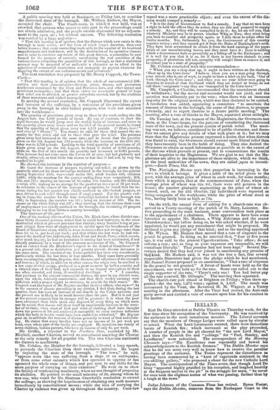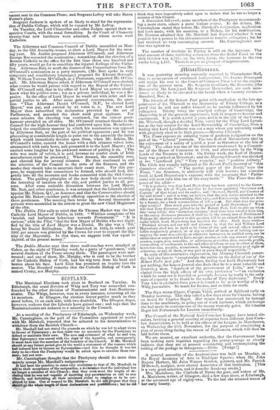IRELAND.
Earl De Grey attended at Dublin Theatre on Thursday week, for the first time since his occupation of the Viceroyalty. He was received by the audience in the most tumultuous manner. The Liberal accounts say that the members of Orange Lodges were called upon by circular to attend. When the Lord-Lieutenant entered, there were immediate bursts of Kentish fire ; which increased as the play proceeded. A number of people in the pit cheered for "the new Lord Mayor," and then the Kentish fire and "yellings " for "Peel, Stanley, and Lyndhurst," were redoubled. The correspondent of the Morning Chronicle says—" His Excellency rose repeatedly and bowed his acknowledgments to the Kentish firemen." The Dublin Monitor says that he did not seem very well to know how to receive the peculiar greetings of the audience. The Tories represent the disturbance as having been commenced by a "knot of vagabonds stationed in the one-shilling gallery," who proposed a cheer for the new Catholic Lord Mayor. The correspondent of the Times avers, that though Lord De Grey "appeared highly gratified by his reception, and laughed heartily at the frequent melees in the pit" in the struggle for seats, "he never for once took the slightest notice of what was passing, further than by a laugh at the rows."
Judge Johnson of the Common Pleas has retired. Baron Foster, says the Dublin Monitor, removes from the Exchequer Court to the
vacant seat in the Common Pleas ; and Sergeant Lefroy will take Baron Foster's place.
Sergeant Jackson is spoken of as likely to stand for the representa- tion of Dublin College, which will be vacated by Mr. Lefroy. On Tuesday, the Lord Chancellor and other Judges opened their re- spective Courts, with the usual formalities. In the Court of Chancery twenty-four new barristers were admitted, of whom seven were Catholics.
The Aldermen and Common Council of Dublin assembled on Mon- day, in the Old Assembly-rooms, to elect a Lord Mayor for the ensu- ing year. Mr. Arabin proposed Alderman O'Connell, and Alderman George Roe seconded the nomination ; remarking, that the election of a Roman Catholic to the office for the first time these one hundred and fifty years, would go far to conciliate the injured feelings of the Catho- lics. Alderman Butt, to mark the dissent of the Conservatives from Mr. O'Connell's nomination as a party measure, (Mr. Butt spoke in very temperate and conciliatory language,) proposed Sir Edward Borough. Mr. William Torrens M'Cullagh, as a Protestant, supported Mr. O'Con- nell. Mr. Alderman Boyce asked, if Alderman O'Connell were elected, what course he would pursue with regard to the Repeal of the Union ? Mr. O'Connell said, that in his office of Lord Mayor no person should know what his polities were ; but as a private individual, he was a Re- pealer. In the office of Lord Mayor he would act with strict and his- partial justice to all. After some general conversation, the ques- tion "That Alderman Daniel O'Connell, M.P., be elected Lord Mayor," was put, and carried by 40 votes to 8. The new Lord Mayor then subscribed the declaration provided by the act of Parliament, and ascended the chair amid great applause. For some minutes the cheering was continued, but the utmost good- humour prevailed on all sides. Mr. O'Connell returned thanks to the Council for the high honour they i had conferred upon him. Be acknow- ledged the conciliatory manner n which his nomination was opposed by Alderman Butt, on the part of his political opponents ; and he was proceeding at considerable length to point out to the assembly the duties which would immediatly devolve upon them, when Mr. Arkins, Mr. O'Connell's tailor, entered the house with a rich crimson velvet robe, ornamented with satin bows, and presented it to the Lord Mayor ; who excited some laughter by his awkward manner of putting it on. [The robe was made of velvet,, it is said, because no scarlet cloth of Irish manufacture.could be procured.] When dressed, the assembly rose, and cheered him for several minutes. He then continued to call the attention of the Council to the state of the finances, and the modes they should take to ascertain their exact state. For this pur- pose, he suggested that committees be formed, who should look dili- gently into all the accounts and books connected with the Old Corpo- ration. The guiding principles of the new body should be economy, the lessening of taxation on the city, and perfect justice to all per- sons. After some amicable discussion between the Lord Mayor, Mr. Butt, and other gentlemen, it was arranged that the Liberals should appoint Mr. Nelson, Q.C., as Assessor, and that the Conservatives should appoint Mr. Baker—neither party offering opposition to the election of these gentlemen. The meeting then broke up. Several thousands of persons were assembled in the streets to greet the new Chief Magistrate of the city.
- The Dublin Pilot calls to mind that Sir Thomas Hacket was the last Catholic Lord Mayor of Dublin, in 1688. " Whitlaw complains of his 'brutish and barbarous behaviour towards Protestant." "It is curious," adds the Pilot, "that the first Mayor of Dublin who was digni- fied by the title of Lord Mayor was a Daniel. He also was a ` being Sir Daniel Bellingham. He flourished in 1665, in which year 5001. per annum was granted by the Crown for ever to support the dig- nity of the Mayoralty. In that time, we suppose-500L was equal to I/40001. of the present money."
The Dublin Monitor says that three mail-coaches were attacked at Caher, on the night of Thursday week, by a party of "gentlemen," with several Justices of the Peace among them. The passengers were mal- treated; and one of them, Mr. Murphy, who is said to be the brother of the Catholic Bishop of Cork, had his wig torn from his head and beaten about his face. Lord Eliot has promised an inquiry into the matter. The Standard remarks that the Catholic Bishop of Cork is named Crotty, not Murphy.



























 Previous page
Previous page